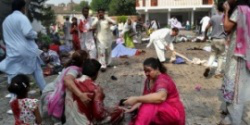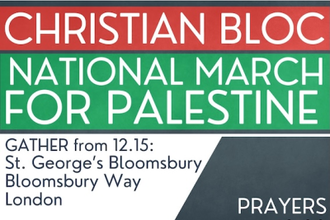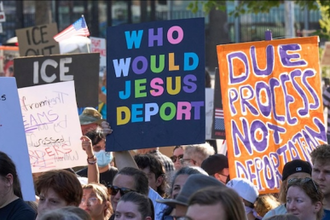Eyewitness report from Pakistan: Hope after church bombing

Aftermath of church bombing
Daniel O’Connor, a Columban priest from New Zealand working in the Diocese of Hyderabad in Pakistan, reports on the aftermath of the Peshawar church bombing two weeks ago.
The prayerful and peaceful atmosphere created by the 600-strong congregation in All Saints Anglican Church, Peshawar, was shattered on 22 September when two suicide bombers exploded their bombs and killed 85 people, plus injuring and maiming many more. Militants linked to Pakistani Taliban have said they carried out the bombing in the city, which lies in what was formerly known as the North-West Frontier of Pakistan.
Life will not be the same for their loved ones again, and not for the Christian community, not for other minorities, and not for the majority of peace loving Muslims in Pakistan.
All Saints Church is the second oldest church in Peshawar and was built in 1893. “Soon after the service ended we came out of the main hall”, said Nazir John, whose clothes were stained with blood; “Some people were greeting each other and others were queuing for food when a suicide bomber blew himself up”.
Pakistan has been plagued by terrorist attacks that have claimed the lives of their leaders and ordinary people, including the most vulnerable. The Christian Community has had a number of crosses to bear as it tries to live, breathe, survive and thrive in Pakistan. The attack on Joseph Colony, Lahore, in March plus the false accusations of blasphemy against a teenage girl in Islamabad are recent reminders of the difficulties they have to endure.
Since 2002 the Christians have generally been spared the wrath of the Taliban who have focused their so called righteousness on ordinary Pakistanis, regardless of sect or religion, on state institutions and on the Shia community in particular in recent years. There had been an attack on a church in Bahawalpur in October 2001 where 16 people were gunned down, another attack on a church in Islamabad followed by a shooting at a Christian school in Murree and a church in Taxila. Back then it was argued that the attacks were a reaction to the invasion of Afghanistan and the aim was to punish the West. Now, 11 years later, a church has been targeted again with horrendous results. But on many occasions before 2001, Christians suffered the violence of members of the majority Muslim community due to false accusations of blasphemy.
So why now is a question that arises? A claim for responsibility, whether authentic or not, was made by a group called Tandool Hafsa, a faction of the banned Tehreek-i-Taliban. A spokesman for the Tehreek-i-Taliban declared, “we have not done this; we do not attack innocent people”.
Imran Khan, Chairperson of the Tehreek-i-Insaf party, in reference to the USA’s use of drones on targets inside Pakistan, as well as recent moves by the government and Taliban to sit down for peace talks, said, “whenever such peace efforts are initiated, drone and terror attacks also escalate, apparently to sabotage the peace overtures”. Christians, who comprise roughly 2% of the estimated 180 million people of Pakistan fear fresh attacks. After the 22 September carnage Anglican Bishop Humphrey of Peshawar stated: “I am afraid that this is the beginning, it can spread to the rest of Pakistan”.
In one district, the administrator and police have advised the Christian Community to raise the boundary walls of their church by at least eleven feet and to top it off with steel wire. Disconcerting advice!
After the bombing, protest demonstrations, vigils and mourning processions erupted in hundreds of towns and cities across the country. In some cities there were incidents of violence where enraged protesters pelted vehicles with stones and blocked roads to vent their anger. Some protestors wielded sticks while others fired shots into the air. Vehicles were pelted with stones, tyres burned and damage was caused to public property. This prompted police to baton charge and fire tear gas.
The protests paralysed the life of Peshawar, the provincial capital of Khyber Pakhtoonkhwa province, where all shops stayed closed to express solidarity with their mourning neighbours, and presumably also out of fear of possible revenge attacks. Life in other large cities was also brought to a standstill on the day after the bombing as Christians and other minorities held demonstrations and protests. Peace activists, representatives of civil society, lawyers and students from various universities also participated and expressed their condolences and solidarity with the Christian community. Protestors carried banners and placards with slogans demanding protection for minorities and immediate arrest of the culprits involved in the tragic incident. Because of the gravity of the situation the authorities made tighter security arrangements.
Bishop Sadiq David of the Church of Pakistan, in reference to the violent demonstrations, said: “It is unfortunate that doing harm in reply to harm has become part of Pakistan’s culture. We are aware of the burning of tyres and road blockages by our youth, but we do not endorse this. We know they are angry but we want to tell them that this is not the way. It does not benefit anyone. There are other ways of registering grievances than resorting to violence.”
Meanwhile family and friends of loved ones killed at the Peshawar church were in deep mourning, preparing bodies for burial and organising mourning processions to the cemeteries. All schools run by the various churches, where children from all religious traditions attend, were closed for three days as an act of solidarity and protest.
In the Columban parish of Badin, in the Southern part of Pakistan in the Diocese of Hyderabad, a peaceful protest rally of a couple of hundred people started off in the church compound but then made its way through the main streets to the press club. Other minority groups also joined including representatives of the Gujarati Hindu community, including a large group of women. The Gurjaratis are a low caste Hindu and like the Punjabi Christians predominately sweep the streets and clean the sewers and because of this work are treated as second class citizens. Normally they keep a low profile but on this day they carried the tools of their trade. Other Hindus plus members of the minority Shia community visited the Church compound to express sympathy and solidarity.
The National Assembly adopted a joint resolution to condemn what it called a “heinous, brutal and inhuman terrorist attack, not only against the Christian community but against all Pakistanis”. A minute’s silence was observed for the Christian fatalities, which was followed by a Fateha prayer for the Muslims who died. The government has vowed to pursue the mastermind of the attack. The Prime Minister, Nawaz Sharif, joined in the condemnations and expressed deep shock and sorrow over the loss of precious human lives. He stated that terrorists have no religion and that targeting innocent people was against the teaching of Islam. Such cruel acts of terrorism reflected the brutality and inhumane mindset of the terrorists. Leaders of most political parties condemned the attack.
Muslim Ulema from different schools of thought condemned the suicide attacks on the church as “un-islamic,” stating: “The attacks were against the teaching of Islam. Islam does not allow attacks on innocent minorities and makes it mandatory to protect their lives and property. “We believe that the attack on the church was a conspiracy against Islam and Pakistan. In Islam the murder of an innocent human being is the murder of the entire humanity.”
The Ulema also urged the government to take effective steps to safeguard minorities in the country and bring to justice the perpetrators because they have violated the constitution of the country which guarantees complete protection to the minorities.
The highly respected non-governmental organisation, the Human Rights Commission of Pakistan, was sickened by the brutal attack. “The massacre of Christian citizens is an affront to the values that Jinnah’s Pakistan must stand for, it is an insult to the principles propagated by Islam and a damming citizens’ indictment of the State for its failure to protect its citizens, especially minorities and their religious freedoms.”
At a peaceful and prayerful protest in Karachi, organised by the National Justice and Peace Commission of the Bishops’ Conference, at which Archbishop Joseph Coutts and a large number of people gathered outside St. Patrick’s Cathedral, people shared their feelings.
Saify Ali Khan, an advocate of the Supreme Court said that what happened gave a wrong message to the international community about Pakistan. “It is really the terrorists who are against Islam here” he said; “they are not Muslims because Islam gives the message of love for the entire humanity”. A young girl commented: “I do not want to think about people being killed when I am at church with my parents”. A young woman quietly said: “For the culprits responsible for the bomb attacks in Peshawar, I can only say, forgive them Father for they do not know what they do.”
In such circumstances, such magnanimity and humanity gives a glimpse of a more peaceful future.
For more information see: www.columbans.co.uk















